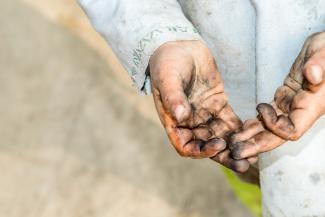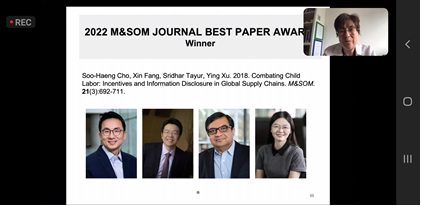
A study titled ‘Combating Child Labour: Incentives and Information Disclosure in Global Supply Chains’ co-authored by Associate Professor of Operations Management Fang Xin from Singapore Management University’s (SMU) Lee Kong Chian School of Business, has been named the 2022 M&SOM Best Paper Award. The Award is an annual accolade conferred to a paper published in one of the prior three volumes of Manufacturing & Service Operations Management (M&SOM) that is deemed by the journal’s editorial board to be most deserving for its contribution to the theory and practice of operations management.
In the study, researchers from SMU, Carnegie Mellon University and the Singapore University of Technology and Design used game theory to identify effective strategies that manufacturers and third parties like non-governmental organisations (NGOs) can use to tackle suppliers’ use of child labour. Through their work, the researchers hoped to address the challenges faced by NGOs and managers at multinational companies who are working to tackle child labour.
To date, there has been little research done to evaluate the impact of efforts aimed at eliminating child labour from global supply chains, such as external monitoring, internal inspections and requirements that manufacturers publicly disclose their anti-child labour measures. This is concerning given that a new report by the International Labour Organisation and UNICEF has found that the number of children in child labour has risen to 160 million worldwide – an increase of 8.4 million children in the last four years – with millions more at risk due to the impact of COVID-19.
In the study, Associate Professor Fang and his co-authors examined how factors such as goodwill cost, information disclosure, inspection cost and type of penalty scheme imposed on suppliers can affect manufacturers’ incentives to use various strategies to combat child labour. They found that raising manufacturers’ goodwill costs reduces the incidence of child labour under all types of penalty schemes tested. Such goodwill costs can be increased by, for instance, consumer education efforts and campaigns undertaken by NGOs. They also found that while information disclosure by manufacturers adopting a zero-tolerance penalty approach towards their suppliers is effective in combating child labour, for those manufacturers who adopt more lenient penalty schemes, information disclosure may inadvertently increase child labour.
“My co-researchers and I are delighted that our paper has received recognition from the M&SOM community. We are glad to see the increasing attention on the issue of child labour in the community. It is our hope that child labour, and corporate social responsibility issues in general, will increasingly become a key factor that influences consumer purchase decisions globally,” said Associate Professor Fang Xin.
To read more about the research, please see:
https://pubsonline.informs.org/doi/10.1287/msom.2018.0733 and https://research.smu.edu.sg/news/2019/may/14/tackle-child-labour-start-consumers.
About M&SOM
Manufacturing & Service Operations Management (M&SOM) is the premier journal for the operations management research community. This bimonthly journal publishes a wide range of research that focuses on the production and operations management of goods and services including technology management, productivity and quality management, product development, cross-functional coordination, and practice-based research.
- End -

